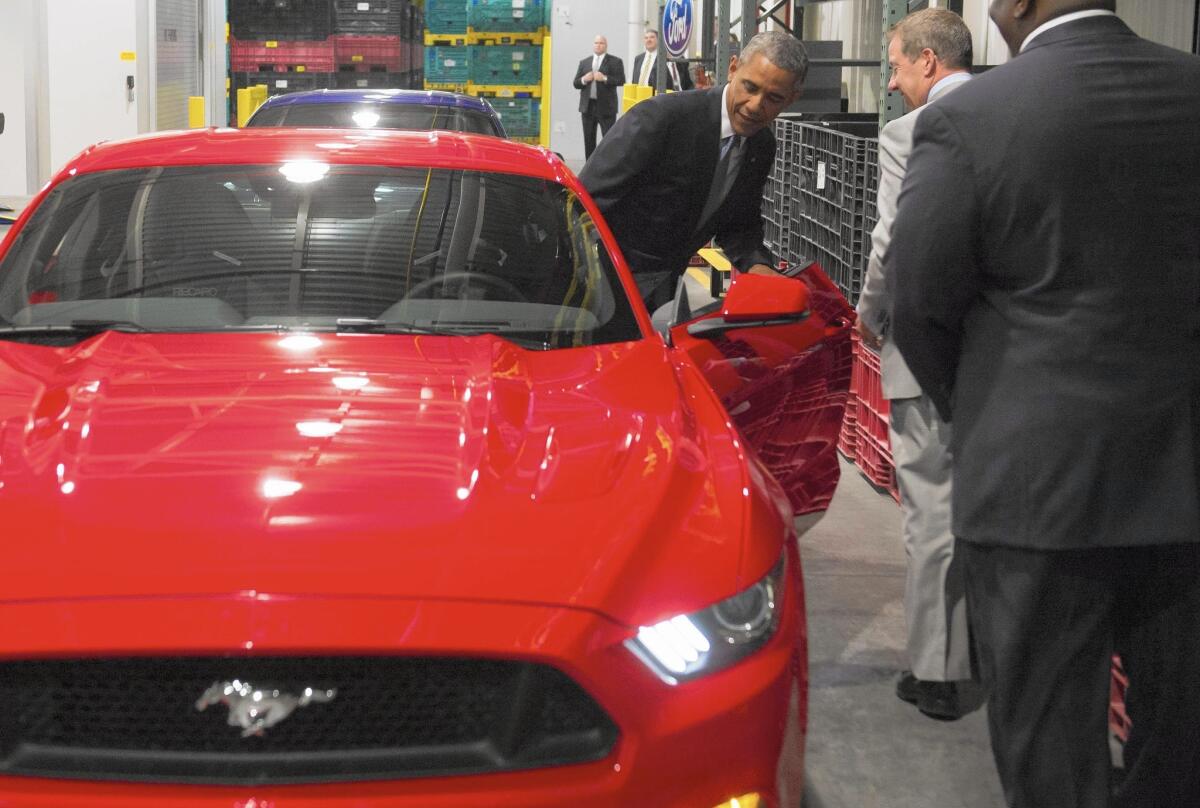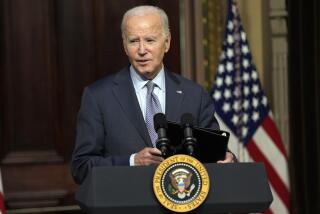Obama jumps ahead of Congress, highlighting economy in Michigan visit

Taking credit for a spate of good economic news and boasting of more to come, President Obama kicked off a three-state tour Wednesday hoping to prove that Republicans’ rise to power in the Capitol this week will not push him to the sidelines.
Speaking at an auto plant outside Detroit, Obama declared that not only is the American auto industry on the mend, but so is the U.S. economy.
“We are entering into the new year with confidence that America is coming back,” Obama told a cheering crowd of autoworkers in Wayne, Mich.
“We’re moving,” he said. “America’s resurgence is real. Don’t let anybody tell you otherwise.... Now that the worst of the crisis is behind us, if we all do our part, if we all pitch in, then we can make sure this rising tide is lifting all the boats, not just some.”
Obama was in Michigan only a few hours, and his remarks focused on cheerleading for the industry he takes credit for reviving. But the visit still spoke to his strategy for confronting his status as a late-term president faced with a GOP-controlled Congress.
Rather than wait for newly empowered Republican lawmakers to lay out their priorities — and lob a few shots at the White House — aides say, the president will push ahead on his agenda with or without cooperation from Congress.
White House officials said the president would unveil significant executive actions on stops later this week, as well as policies that would require congressional cooperation.
From Michigan, Obama flew to Phoenix, which was also in economic turmoil when he took office. There, on Thursday he’ll discuss his plans to make housing more affordable to the middle class, including a decision to lower the annual mortgage insurance premiums for borrowers backed by the Federal Housing Administration.
While careful not to declare that the U.S. economy has made a full comeback, the White House is more confidently pointing to signs of recovery: the best quarterly growth in a decade, a recent all-time high for the Dow Jones industrial average, rising consumer confidence and low gas prices.
On Friday, Obama is due in Tennessee to highlight new efforts on job training and making higher education more affordable. Aides billed the tour as a preview of his State of the Union address this month.
Advisors describe the plan as a continuation of what the president last year dubbed his “pen and phone” strategy, a yearlong campaign to work around a deadlocked Congress.
The White House believes the strategy was validated in the final weeks of 2014. After Obama announced a major shift in immigration policy, a climate change deal with China and a reset of half a century of U.S. policy toward Cuba, his public approval rating inched up at the end of the year, hitting a 16-month peak in Gallup polls.
White House aides see the boost as proof that Americans want to see the president in action, even if his moves are controversial or spark backlash from Congress.
“These are the plays we ran in 2014 and they were successful. And that’s why we’re running them now,” said one White House official, who requested anonymity to discuss the plans.
But Republicans say they are baffled by the claims of victory and disappointed by Obama’s decision to rerun 2014, a year in which many of his executive maneuvers were overshadowed by foreign policy crises, his party all but banished him from the campaign trail, and Democrats were clobbered in the midterm election.
“It’s almost like he’s pretending it didn’t happen,” said Republican pollster David Winston, an advisor to congressional leaders. “Elections are statements from the electorate about how things are going. And they made a pretty clear statement.”
Winston argued that the White House appeared to be missing what he said was the message of the midterm: that Americans wanted a different policy direction and to see leaders in Washington working together.
Obama’s first moves of the year weren’t aimed at bipartisan outreach. On Tuesday, as Republicans officially took control of the Senate, the White House announced it would invite congressional leaders for a sit-down — but not until next week, after the president’s travels.
White House spokesman Josh Earnest then announced Obama’s veto threat against two bills that Republicans prioritized, one approving the Keystone XL pipeline and the other adjusting the definition of full-time work under the Affordable Care Act.
Republicans zeroed in on the Keystone veto promise to blame the president for stalling a project they say can only help the American economy.
“The president is not going to set the agenda for us here in the Senate,” said Senate Majority Leader Mitch McConnell of Kentucky. “We have an agenda that we believe helps save and create jobs for Americans. If the president wants to be a part of that, he can sign the bill if it makes it to his desk.”
Both McConnell and Obama say they are focused on jobs and the economy, but they disagree on whose policies are responsible for the upturn. They also appear to agree on the areas where compromise may be possible, if politics don’t get in the way.
Both have listed infrastructure and tax reform as likely legislative targets, as well as trade. But in Michigan, where massive free trade pacts are looked upon skeptically by labor groups, Obama skipped any detailed explanation of his plans to push such deals through the Senate.
Rather, he returned to a well-worn message not just about the resurgence of the U.S. auto industry and American manufacturing, but about his economic vision for lifting the middle class.
Companies work best when executives and workers act like “everyone’s in it together,” Obama said. “And when the company’s doing better, the workers have got to get their share as well.”
The American economy is like the autoworkers of greater Detroit, he said:
“We get up; we fight back. We come back stronger than before.”
kathleen.hennessey@latimes.com
Michael A. Memoli in the Washington bureau contributed to this report.
More to Read
Get the L.A. Times Politics newsletter
Deeply reported insights into legislation, politics and policy from Sacramento, Washington and beyond. In your inbox three times per week.
You may occasionally receive promotional content from the Los Angeles Times.








